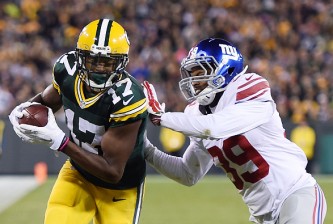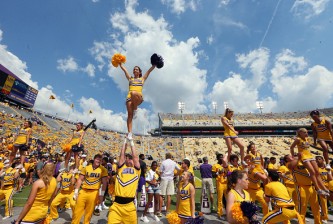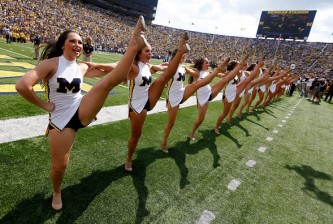Time for the Fang’s Bites Sports Media Year in Review. The year isn’t big enough for a Top Ten, but it is big enough for a Big Dozen. Let’s get to the list and we’ll count down from 12 and also have some Honorable Mentions.
12. ESPN The Book
One of the most anticipated books of the year for the sports media was “Those Guys Have All the Fun: Inside the World of ESPN” co-authored by Tom Shales and James Andrew Miller. Some of the more salacious and sensational stories were leaked and released before its publication. But when all was said and done, the tome was more of a detailed history lesson of how ESPN was created and rose to become the biggest content provider in sports media. The book became a New York Times best seller and is being made into a major motion picture by 20th Century Fox.
11. ESPN vs. NBC
The battle lines have already been drawn between the two networks, but with owner, Comcast, merging its cable sports properties of Versus, Golf Channel and the Comcast SportsNet regional affiliates under the NBC Sports Group, the Peacock is positioning itself to become a major competitor to ESPN. NBC Sports has already obtained Major League Soccer and horse racing, increased NHL content, announced an Olympic presence and will create a Sunday NFL pregame show for Versus which will be rebranded this weekend.
ESPN is not sitting back aggressively expanding its college sports portfolio and keeping Monday Night Football.
With MLB, NASCAR and the BCS up for bid in 2012, NBC Sports could be strengthened with more content for its cable properties or ESPN could continue its monolithic path to World Domination.
10. UFC Signs With Fox
Mixed Martial Arts went mainstream with the Ultimate Fighting Championships signing an 8 year, multi-million dollar contract with Fox. The first UFC bout on Fox in November didn’t last very long, but it did do well in the key male demographics. Starting in January, UFC programming will be seen on various Fox platforms including FX and Fuel. Both sides expect to reap huge benefits and I would not doubt to see UFC get big bids for its second network contract in eight years.
9. Long-time Executives Leave Their Respective Networks
Just before NBC Sports was about to present its bid for the Olympics, Emperor Dick Ebersol resigned over a contract dispute. While observers thought it would leave NBC Sports vulnerable, it still won the rights for four Olympiads and kept Sunday Night Football. While he may have clashed with the new Comcast administration, Ebersol’s legacy on the network over two decades cannot be diminished. He is still working for NBC as a consultant on Sunday Night Football and will assist on the 2012 London Olympics.
HBO Sports President Ross Greenburg resigned in July after being with the network for 33 years. Under his tenure, Greenburg increased HBO’s commitment to documentaries and created the successful 24/7 reality series, not just focusing on the network’s signature sport of boxing, but reaching out to NASCAR and the NHL. Greenburg is now producing content for both NBC Sports and the NHL.
And George Bodenheimer announced late this year that he would leave as President and become Chairman of the Alleged Worldwide Leader. He’ll be succeeded by Vice President of Content John Skipper. Bodenheimer steered ESPN into high definition and helped to create ESPN 3D. Plus, he was able to make Monday Night Football into a cable series after 35 years as a network TV mainstay. Bodenheimer, who I’ve jokingly labeled the ESPN Dictator will no longer be in a day-to-day role with ESPN.
8. NBA/NFL Lockout Coverage
Two sports leagues stressed out their fans by making them wait out negotiations over collective bargaining agreements with their players. Instead of anticipating the draft or schedule releases, coverage over labor talks dominated sports media. As negotiations dragged on, reporters were camped out waiting for the latest news which came out as quickly as toothpaste being pushed out of a tube.
NFL Network and ESPN went wall-to-wall with non-stop coverage as a deal neared. The same for NBA TV.
Both leagues finally hashed out agreements and brought labor peace. Eventually, the NFL only lost a preseason game after a ten year CBA with its union. The NBA wasn’t as lucky as almost two months of its schedule was lost and it had to proceed with a reduced 66 game schedule.
7. ESPN/Univision Lose the World Cup to Fox/Telemundo
Honestly, who saw this coming? ESPN’s signature global sports event has been the World Cup. It’s been carrying the event since 1994. Univision’s history with the World Cup dates back to 1978. Both networks have been known for carrying the World’s biggest soccer games. However, that will change in 2015 when Fox and Telemundo take over the English and Spanish language US rights respectively for two Men’s and Women’s World Cups through 2022.
ESPN and Univision were simply outbid by Fox and NBC, the owner of Telemundo. One could argue that the World Cup whose ratings have been steadily going up became a desired property thanks to ESPN’s and Univision’s coverage.
ESPN and Univision get one more World Cup to bid farewell to FIFA and that will be in Rio in 2014.
6. NBC Sports Group Keeps The NHL
Fending off a spirited bid by ESPN, NBC signed a 10 year deal to keep the NHL in the fold in a combined network and cable bid. After pledging to increase games on cable and also give fans national access to all postseason games on its platforms, NBC Sports Group was able to keep the NHL rights. Now the NHL has a permanent place to call its home and NBC has firmly committed to hockey which pleases the sport’s fans to no end.
And please, let’s not mention that ESPN would be better for the NHL.
5. ESPN’s Influence on College Sports including The Longhorn Network
It’s amazing to see how much inventory ESPN has collected in college sports. Not only has it signed the ACC, Big Ten, Pac-12, SEC, several non-BCS conferences and a few individual schools to long-term contracts, it also has created the Longhorn Network for the University of Texas. The whole concept of the Longhorn Network has led to massive upheaval among the BCS conferences with Texas A&M leaving the Big 12 and heading to the SEC, the Big East’s Pittsburgh and Syracuse leaving for the ACC and other schools wanting to leave their leagues for bigger exposure and more ESPN cash.
And not only does ESPN have a hand in these chess games (despite massive denials), it has to cover all of this leading to conflicts of interest. And while ESPN pays megabucks for the NFL, its roots are firmly entrenched in college sports as we have seen with its new contract with the NCAA to air several championships.
ESPN also owns a whole host of bowl games and college basketball tournaments all of which are needed inventory for programming. By owning the games, ESPN doesn’t have to pay a rights fee. Crowds aren’t needed because ESPN makes money once the ads are sold and fees are paid by the cable and satellite providers.
ESPN’s influence in college sports will be a story that will followed for several years to come.
4. #freebruce
This story became a story thanks to SportsbyBrooks and social networking. Without these two combinations, an ESPN internal suspension might not have been noticed, reported and scrutinized. This all began with then-ESPN.com college football writer Bruce Feldman co-authored a book with former Texas Tech football coach Mike Leach. In the book, Leach alleged that then-ESPN college football analyst Craig James had a hand in his firing from the school over treatment of James’ son.
Feldman says he informed his bosses that he was writing a book with Leach and got their blessing. When the book was released, ESPN suspended Feldman. It was there that blogs and social networking got involved. SportsbyBrooks reported that Feldman was suspended. ESPN denied it. Other college football writers who follow Feldman on Twitter noticed he wasn’t tweeting. The story boomeranged on ESPN. It didn’t end until Feldman left ESPN for CBS Sports.
But this whole story made observers wonder why ESPN chose to hang its hat with James.
3. CBS, ESPN, Fox and NBC Renew the NFL at a Hefty Price
Starting in 2014, the NFL will receive an estimated $5 billion in rights fees from its TV partners. That’s a huge increase from the current amount from the four networks. In addition, all of the current packages will remain with the current networks so there will be no upheaval as in the past three NFL TV contracts.
All of the networks except for ESPN have signed on for 9 years. ESPN reupped for 8. ESPN looks like it will enter the postseason with a Wild Card Playoff game. NBC gains a Thanksgiving Night game, a Divisional Playoff game and more flex scheduling. CBS and Fox also get some flex scheduling to boost their ratings.
And with CBS, Fox and NBC paying on the average of $1 billion each, the NFL has fattened its war chest. Expect another partner for a Thursday Night Football package to be announced sometime in 2012.
The NFL is the ratings king and the money is proof.
2. NBC Keeps the Olympics at a Hefty Price
There were indications before the bidding for the 2014/16 Olympics that NBC was vulnerable (see #9 above). Long-time NBC Sports Emperor Dick Ebersol had left. ESPN and Fox showed indications that they wanted to take the Games away from NBC which had been broadcasting the Olympics since 1988. It looked like the International Olympic Committee was poised go with another TV partner. But when all was said and done, NBC had ponied up $4.38 billion for four Olympiads from 2014 through 2020 and the Olympics were firmly under the NBCUniversal umbrella.
What happened? ESPN bid for only one set of Olympics, 2014/16 and Fox made two separate bids and came close at $3.4 billion. However, when it came time to step up, NBC did and kept the Games in a very spirited bid to the IOC.
After losing money on the 2010 Winter Olympics, NBC’s parent company, Comcast claims it will be profitable on the four set of Games. That remains to be seen.
1. Penn State/Syracuse Media Coverage
Scandal once again dominated the sports media. However, in the case of Penn State, it wasn’t sports writers who uncovered the alleged molestation of young boys by former defensive coordinator Jerry Sandusky. Taking the lead in the coverage was the Harrisburg Patriot-News and in particular, crime reporter Sarah Ganim. Also, Penn State’s student newspaper, the Daily Collegian didn’t sit tight either reporting the story. The national media finally caught up and Bob Costas’ interview of Sandusky on NBC’s Rock Center raised eyebrows. And while ESPN tried its best to report the story, it was way behind. The Sandusky scandal will continue as it goes to trial and it won’t be going away any time soon.
As for the Syracuse story on the alleged molestations by former Syracuse assistant coach Bernie Fine, ESPN had a tape of Fine’s wife, Laurie, talking to one of the accusers. The problem was, it was 8 years old and ESPN gave the appearance that it sat on the story. While network bosses tried to explain their decision, some accused ESPN of not giving what they had to the police. No matter of the explanations, ESPN’s role in this story will be debated and whatever it says won’t be enough for some critics.
There were lessons learned in the reporting of both scandals. We learned that local reporters on the ground will always have an advantage over national correspondents. And we learned that while ESPN has a good stable of reporters, it can’t be everywhere.
Honorable mentions:
- ESPN Fires Ron Franklin
- CBS/Turner 1st Partnership on the NCAA Tournament is Successful
- NFL Films Founder Ed Sabol Inducted into the Pro Football Hall of Fame
- ESPN Nabs Wimbledon from NBC
- Los Angeles Lakers Sign Long-Term Deal to Create a Regional Sports Network With Time Warner Cable
- Los Angeles Dodgers Fight with Fox Over Media Rights
- Gus Johnson Leaves CBS for Fox
- Women’s World Cup Scores For ESPN
- Hank Williams, Jr. Pulled From Monday Night Football
- Matthew Barnaby Loses ESPN Gig
Coming up before the year is over, Best and Worsts in Sports Broadcasting in 2011 and Predictions for 2012.






















